Discover Travel Tales by Afar
Travel Tales by Afar
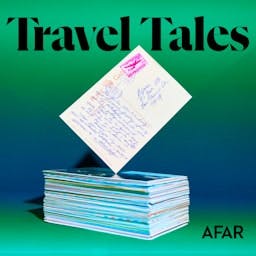
Travel Tales by Afar
Author: Afar
Subscribed: 101,590Played: 211,340Subscribe
Share
Description
Travel, at its best, changes the way we see the world. Join us each week as we dig into stories from people who took a trip—and came home transformed. Travel Tales by Afar is your ticket to the world, no passport required.
83 Episodes
Reverse
Author Charmaine Craig had always felt mysteriously drawn to India—pulled by childhood family legends of ancestors who arrived there centuries ago and copper plates inscribed with ancient privileges that still hang in a Kochi synagogue. But it would take a chance encounter at a dinner party—and the power of old friendship—to finally help her explore her roots.
She set out on a pilgrimage through Kerala's ancient Jewish communities with a former college boyfriend turned U.S. Ambassador to India and a mutual friend who orchestrated their reconnection. From sacred sunrises where three seas converge to an impossible meeting with the last two Jews of Kochi, Charmaine discovers that sometimes journeys into the past have the power to change your life—especially when you have good friends by your side.
Don't miss these transformative moments
The dinner party revelation that set everything in motion
Why Charmaine's childhood bedroom featured only one map—of India
The legend of her ancestor who saved a ruler's son in 10th-century India
Traveling by presidential motorcade through Kerala's lush landscapes
The 4 AM journey through cyclonic winds to witness sunrise where three seas meet
Meeting Keith and Queenie, the reclusive last Jews of Kochi who "never see visitors"
The moment in the sacred waters that changed everything
How friendship, timing, and ancestral calling converged to open a new chapter
Resources
Learn more about Charmaine Craig at charmainecraig.com
Buy Charmaine's books: Miss Burma and My Nemesis
Read Charmaine's Spin the Globe trip to Portugal or listen to theTravel Tales episode
Read the transcript of the episode
Be sure to subscribe to the show and to sign up for our podcast newsletter, Behind the Mic, where we share upcoming news and behind-the-scenes details of each episode. And explore our other podcasts, Unpacked, which unpacks a tricky topic in travel each week, and View From Afar, where we spotlight the people and the ideas shaping the future of travel.
Travel Tales by Afar is part of Airwave Media's podcast network. Please contact advertising@airwavemedia.com if you would like to advertise on our podcast.
Learn more about your ad choices. Visit megaphone.fm/adchoices
When 16-year-old Jayla Nicholas from New York City packed her one carry-on suitcase for Guatemala, she thought she had everything figured out. A seasoned city kid who loves the smell of airports and dreams of seeing the world, Jayla was ready for her second international trip, an adventure through Afar's Learning Afar program with Global Leadership Adventures.
But Guatemala had lessons she never expected—from the vibrant yellow and purple buildings that felt "more real" than NYC's concrete jungle, to zip-lining through mountain canyons in a sudden downpour, to discovering that "pack light" advice might be the biggest travel myth of all.
In this episode, we follow Jayla's journey from pre-trip excitement to post-adventure wisdom, as she learns about leadership, gratitude, and what it really means to be prepared for the unexpected.
Don't miss these unforgettable moments:
Why Jayla loves the smell of airports and considers flying a gift
The colorful contrast between Guatemala's vibrant buildings and NYC's concrete jungle
Working with elementary school kids who copied her every move (including snack time)
An epic zip-lining adventure that turned into a rain-soaked truck ride sing-along
The tamale that challenged her Chipotle-loving palate
How flushing toilet paper became a luxury she'd never considered
The floating egg chair moment overlooking volcanoes that perfectly captured her gratitude
Why she's officially converting from underpacker to overpacker (and her advice for fellow picky eaters)
Resources
Learn more about Learning Afar and how to support future student travelers
Be sure to subscribe to the show and to sign up for our podcast newsletter, Behind the Mic, where we share upcoming news and behind-the-scenes details of each episode. And explore our other podcasts, Unpacked, which unpacks a tricky topic in travel each week, and View From Afar, where we spotlight the people and the ideas shaping the future of travel.
Travel Tales by Afar is part of Airwave Media's podcast network. Please contact advertising@airwavemedia.com if you would like to advertise on our podcast.
Learn more about your ad choices. Visit megaphone.fm/adchoices
When polar bear biologist Alysa McCall was growing up in Kamloops, British Columbia, watching black bears raid fruit trees outside her living room window, she never imagined she'd dedicate her life to their Arctic cousins. But sometimes the most profound career changes happen when you least expect them—like when a world-renowned scientist responds to your "what's the worst that could happen?" email with "Sure. Come over. See you in September."
McCall's journey from studying desert mice to becoming a polar bear researcher took her from the semi-arid landscapes of British Columbia to the frozen sea ice of Hudson Bay, where she learned that conservation isn't just about data—it's about connection, storytelling, and what she calls "big feelings."
Don't miss these unforgettable moments:
Growing up with black bears as backyard visitors (and banging pots to make them leave)
The "imposter syndrome" email that changed everything
Sleeping on a tundra buggy and mistaking a polar bear for a rock
Getting stranded alone on moving sea ice in -30°F weather
The mortifying moment of accidentally pointing a shotgun at your helicopter pilot (who later became her husband)
Holding her first polar bear cub and feeling the weight of conservation responsibility
Why emotion and storytelling are the key to saving Arctic habitat
The sobering reality: this polar bear population has dropped from 1,200 to just over 600 bears
The Science Behind the Story:
McCall explains why polar bear conservation requires a completely different approach than other wildlife protection—you can't fence sea ice or hire patrols to guard it. Saving polar bears means addressing global climate change, making it one of the most complex conservation challenges on Earth.
Resources:
Learn more about Polar Bears International
Discover Churchill, Manitoba as a polar bear viewing destination
Read the transcript of this episode
Listen to Alysa McCall's TED talk
Be sure to subscribe to the show and to sign up for our podcast newsletter, Behind the Mic, where we share upcoming news and behind-the-scenes details of each episode. And explore our other podcasts, Unpacked, which unpacks a tricky topic in travel each week, and View From Afar, where we spotlight the people and the ideas shaping the future of travel.
Travel Tales by Afar is part of Airwave Media's podcast network. Please contact advertising@airwavemedia.com if you would like to advertise on our podcast.
Learn more about your ad choices. Visit megaphone.fm/adchoices
When Santi Elijah Holley, writer and author of An Amerikan Family: The Shakurs and the Nation They Created, was 25, he took the ultimate travel leap of faith: He hitchhiked 400 miles from Northern California to Portland through small-town Oregon. But for Holley—who had just moved to Portland from Michigan—it wasn't just about getting a ride. After a year of feeling like an outsider as a person of color in one of America's whitest states, this journey would test whether Oregon would accept him or leave him standing on the side of the road.
What he discovered during those three days hitchhiking along Highway 101 changed everything. From sleeping on church roofs to walking barefoot on the beach with a wealthy New Yorker, and listening to a mother's fight for youth spaces to riding with speeders heading to court, Holley found that Oregon's people had stories to tell—and that he was the perfect stranger to hear them.
Don't miss these unforgettable moments
Why Holley thought of himself as a teenage "brown-skinned Kerouac" in Michigan
Walking barefoot on an Oregon beach with a wealthy stranger in a red convertible
The mom who's single-handedly saving her town's crumbling teen center with mop buckets and determination
A white-knuckle ride with a speeding driver on his way to DUI court
The paper mill ghost town and one man's 15-year story of economic change
Sleeping on a church roof under the stars (and why Holley calls it "urban camping")
The Willie Nelson cassette tape that sparked a conversation about human connection
How three days on Highway 101 revealed Holley's future as a journalist
Resources
Visit Santi Elijah Holley's website: santielijahholley.com
Read his book An Amerikan Family: The Shakurs and the Nation They Created
Read the transcript of the episode
Read Santi's Afar story about New Orleans
Be sure to subscribe to the show and to sign up for our podcast newsletter, Behind the Mic, where we share upcoming news and behind-the-scenes details of each episode. And explore our other podcasts, Unpacked, which unpacks a tricky topic in travel each week, and View From Afar, where we spotlight the people and the ideas shaping the future of travel.
Travel Tales by Afar is part of Airwave Media's podcast network. Please contact advertising@airwavemedia.com if you would like to advertise on our podcast.
Learn more about your ad choices. Visit megaphone.fm/adchoices
Dr. Jessica B. Harris, renowned food historian and author of High on the Hog, which later became a hit Netflix series of the same name, reveals the shocking truth about American cuisine—it's not what you think. From her couch in Brooklyn with a Siamese cat wandering by, Dr. Harris unpacks the surprising origins of beloved American classics and introduces us to the concept of the "American braid."
Her new book, Braided Heritage: Recipes and Stories on the Origin of American Cuisine, weaves together the three cultural strands that created what we eat today: Indigenous, European, and African influences. But prepare to have your assumptions shattered—coleslaw is Dutch, cookies aren't American, and the "wok hand" of enslaved African Americans shaped Southern food in ways we're only beginning to understand.
Don't miss these eye-opening revelations:
Coleslaw comes from Dutch "kool sla" (cabbage salad)—not American at all
Cookies and waffles are Dutch gifts hiding in plain sight
The "wok hand" concept and why Southern food doesn't taste British
How barbecue represents the cultural braid of Africa and Europe
Dr. Harris's childhood travel bug that started at the UN International School
Her 50+ year relationship with a French host family
Building chosen families across three continents: France, West Africa, and Brazil
Why she's wittier in French and can flirt better too
The personal recipes closest to her heart: her mother's fried chicken and grandmother's watermelon rind pickles
Resources:
Read Dr. Jessica B. Harris's Braided Heritage: Recipes and Stories on the Origin of American Cuisine
Watch High on the Hog on Netflix and read the book
Read her memoir, My Soul Looks Back
Learn more about Chef Sean Sherman's indigenous food work
Read an excerpt on afar.com from Dr. Harris's Vintage Postcards from the African World: In the Dignity of Their Work and the Joy of Their Play
Read an interview on afar.com with Dr. Harris about New Orleans, where she also lives for part of the year
Read the transcript of the episode.
Be sure to subscribe to the show and to sign up for our podcast newsletter, Behind the Mic, where we share upcoming news and behind-the-scenes details of each episode. And explore our other podcasts, Unpacked, which unpacks a tricky topic in travel each week, and View From Afar, where we spotlight the people and the ideas shaping the future of travel.
Travel Tales by Afar is part of Airwave Media's podcast network. Please contact advertising@airwavemedia.com if you would like to advertise on our podcast.
Learn more about your ad choices. Visit megaphone.fm/adchoices
This is a replay episode from Season 4 featuring Ryan Knighton's journey to Kaua'i.
Ryan Knighton, AFAR contributing writer, TV writer for Billions, and author of Cockeyed: A Memoir, takes us on an extraordinary adventure to surf Hawaii's legendary Hanalei Bay. Despite being blind since his early twenties, Ryan has never let that stop him from exploring the world—and surfing has become his unique form of freedom.
The episode opens with host Aislyn Greene interviewing Ryan about his surfing background and travel philosophy, then transitions into Ryan's captivating first-person story (read by actor Andrew Galteland). After 13 years of mastering the waves near his Vancouver Island home, Ryan decided to challenge himself by surfing completely unfamiliar waters in Hawaii. What unfolds is a story about trust, collaboration, and finding liberation in the most unexpected places.
In this episode, you'll discover
How a deaf friend taught a blind man to surf in a comedy of miscommunication
Why Ryan describes surfing as "dancing with a wave" and his escape from the "boredom of being safe"
The art of guidance—what makes a great travel guide versus one who just shows you around
How Ryan navigates ocean dangers by feeling water currents and listening to wave patterns
Don't miss these powerful moments
Ryan's first taste of freedom on an 11-foot surfboard that felt like "riding a sidewalk"
The ingenious toe-hook technique that got Ryan safely through dangerous rip currents
Using a clock face system to communicate wave direction when words barely carry over ocean noise
The profound realization that surfing takes him "deeper inside" while sighted surfers look outward
How Ryan's wife Tracy demonstrates ultimate trust by dropping him at the beach and returning hours later
Resources
Read more of Ryan's travel stories on afar.com
Follow Ryan Knighton on X
Listen to Andrew and producer Nikki's podcast Looters
Previous episode: Ryan's Zimbabwe safari adventure
Be sure to subscribe to the show and to sign up for our podcast newsletter, Behind the Mic, where we share upcoming news and behind-the-scenes details of each episode. And explore our other podcasts, Unpacked, which unpacks a tricky topic in travel each week, and View From Afar, where we spotlight the people and the ideas shaping the future of travel.
Travel Tales by Afar is part of Airwave Media's podcast network. Please contact advertising@airwavemedia.com if you would like to advertise on our podcast.
Learn more about your ad choices. Visit megaphone.fm/adchoices
Jim Kitchen, professor of entrepreneurship at UNC Chapel Hill, has visited all 193 countries, rocketed 66 miles into space with Blue Origin, and descended seven miles to the ocean's deepest point—but his most important journey was learning to connect rather than just collect experiences.
From childhood road trips in a wood-paneled station wagon to becoming one of only 700+ people who've seen Earth from space, in this episode of Travel Tales by Afar, Jim reveals how travel transformed him from a frantic collector into a mindful connector—and how trusting his instincts literally saved his life.
In this episode, you'll discover
How travel resolved an existential crisis—and changed everything
What it's really like to rocket into space at 2,300 miles per hour
Why listening to life's "nudges" can be a matter of survival
Don't miss these transformative moments
Growing up with "genetic wanderlust" and seeing America backwards from a station wagon
The Afghan marketplace moment that shifted his approach from collecting to connecting
Negotiating a space travel prenup and the emotional stages of preparing for launch
Slapping himself awake at 2,300 mph because he wasn't going to be "that guy"
The profound silence of space and seeing Earth without borders
Smuggling pounds of stickers to space in oversized socks (sorry, Blue Origin!)
Descending seven miles down to find life thriving in the most inhospitable conditions
The nudge that saved his life when he walked away from the doomed Titan submersible
Resources
Read the transcript of the episode
Follow Jim Kitchen on Instagram
Learn more about Blue Origin space tourism
Read about the Challenger Deep and Mariana Trench exploration
Be sure to subscribe to the show and to sign up for our podcast newsletter, Behind the Mic, where we share upcoming news and behind-the-scenes details of each episode. And explore our other podcasts, Unpacked, which unpacks a tricky topic in travel each week, and View From Afar, where we spotlight the people and the ideas shaping the future of travel.
Travel Tales by Afar is part of Airwave Media's podcast network. Please contact advertising@airwavemedia.com if you would like to advertise on our podcast.
Learn more about your ad choices. Visit megaphone.fm/adchoices
Mickela Mallozzi, Emmy award-winning host of PBS's Bare Feet with Mickela Mallozzi, transforms strangers into dance partners across seven continents.
Whether learning sean-nós in Ireland or celebrating Matariki in New Zealand, in this episode of Travel Tales by Afar, Mickela reveals how asking permission opens doors to authentic cultural experiences—and why the best travel connections happen when you follow your passion.
In this episode, you'll discover
How cultural appreciation differs from cultural appropriation—and why permission is key
What it's like to film a travel show without rehearsals or mirrors
Why dance reveals migration patterns and cultural connections across continents
Don't miss these transformative moments
[03:00] How Mickela's mission evolved from selfish adventure to platform for marginalized communities
[06:00] The weekly Zoom meetings with Māori elders that made filming in New Zealand possible
[11:00] Growing up in an immigrant family—from slaughtering chickens in Italy to catching the travel bug
[14:00] The Europade festival that reminded her why she fell in love with this work
[19:00] How Irish sean-nós connects to Appalachian clogging and eventually becomes tap dancing
[23:00] Why the Caribbean is her favorite place to see cultural fusion in action
[28:00] Her best travel advice: Find what you love at home, then do it everywhere you go
Read the transcript of the episode
Follow Mickela Mallozzi on Instagram.
Watch Bare Feet with Mickela Mallozzi seasons 7 and 8 (premiering December 2025)
Read more about Mickela's adventures in Ireland and Morocco on afar.com.
Be sure to subscribe to the show and to sign up for our podcast newsletter, Behind the Mic, where we share upcoming news and behind-the-scenes details of each episode. And explore our other podcasts, Unpacked, which unpacks a tricky topic in travel each week, and View From Afar, where we spotlight the people and the ideas shaping the future of travel.
Travel Tales by Afar is part of Airwave Media's podcast network. Please contact advertising@airwavemedia.com if you would like to advertise on our podcast.
Learn more about your ad choices. Visit megaphone.fm/adchoices
Jaymee Sire, host of Food Network Obsessed podcast, trades tasting menus for throttle grips at the legendary Sturgis Motorcyle Rally in South Dakota.
Whether riding two-up through the Black Hills or bonding over leather stamping and welding with a multigenerational crew of women riders, in this episode of Travel Tales by Afar, Jaymee reveals the side of Sturgis Buffalo Chip few outsiders get to see.
125 Bikers, 50 Miles, and One Beginner Biker
In this episode, you’ll discover:
Biker Belles, the annual women’s ride that breaks biking stereotypes.
What it’s like to attend Sturgis Buffalo Chip, one of the nation’s oldest music festivals.
Why winding through the Black Hills in South Dakota is so much better on a bike.
The Side of Sturgis Most Tourists Miss
Don’t miss these transformative moments:
[03:08] What it’s like to arrive at one of the largest motorcycle rallies in the country
[07:35] This annual ride shows the feminine side of biking culture.
[11:51] That moment when a motorcycle ride becomes a soul-filling, sightseeing tour.
[14:21] Tears, Jelly Roll, and pork parfaits: Going beyond biking at Sturgis Buffalo Chip
Resources
Read the transcript of the episode
Follow Jaymee Sire on Instagram
Listen to her on the Food Network Obsessed podcast
Learn more about the Sturgis Buffalo Chip and the Biker Belles ride
Be sure to subscribe to the show and to sign up for our podcast newsletter, Behind the Mic, where we share upcoming news and behind-the-scenes details of each episode. And explore our other podcasts, Unpacked, which unpacks a tricky topic in travel each week, and View From Afar, where we spotlight the people and the ideas shaping the future of travel.
Travel Tales by Afar is part of Airwave Media's podcast network. Please contact advertising@airwavemedia.com if you would like to advertise on our podcast.
Learn more about your ad choices. Visit megaphone.fm/adchoices
Kentucky native and comedian Katherine Blanford takes us on a hilarious journey across America, sharing how different regions react to humor and why the Pacific Northwest has become her performing paradise. From childhood road trips to Cracker Barrel to navigating regional comedy crowds, Katherine reveals the art of connecting with audiences nationwide—plus her brutally honest airport confessions.
From Cracker Barrel to Comedy Clubs
In this episode, you'll discover:
How a Kentucky kid who thought Calgary was "international travel" became a touring comedian
Why the Pacific Northwest produces Katherine's favorite audiences (hint: they're cold, drunk, and unpretentious)
The secret to reading crowds from the arm-crossing Midwest to the hootin'-and-hollererin' South
What makes small towns like Great Falls, Montana, comedy gold
Comedy Across America
[06:15] Growing up in Louisville with dreams of horses and trips to Churchill Downs[15:30] The cultural shift from 31 years in the Southeast to touring nationwide[22:45] Decoding regional audience reactions—from Midwest nodders to Southern hollerers[28:20] Why Pacific Northwest crowds are a comedian's dream[35:10] The legendary Arizona crowd work story and learning to read local "creatures"
A Comedian's Guide to Regional Humor
Katherine Blanford's sharp Southern wit has earned her spots at comedy clubs nationwide, with her latest special "Catholic Cowgirl" showcasing her unique perspective on growing up in Kentucky horse country. Her approach to comedy goes beyond just getting laughs—she studies each town like an anthropologist, understanding what makes different communities tick.
In this episode, you'll hear how Katherine transforms her childhood obsession with horses (she couldn't have one, so she became one) into crowd work gold, and why she had to retire her famous "neigh-off" challenge after Chicago audiences got too competitive.
Resources
Read the transcript of the episode
Catch Katherine live at upcoming shows in Sunnyvale, California, Oklahoma City, and Tulsa
See her at Red Rocks this October with Bert Kreischer
About Travel Tales by Afar
Be sure to subscribe to the show and to sign up for our podcast newsletter, Behind the Mic, where we share upcoming news and behind-the-scenes details of each episode. And explore our second podcast, Unpacked, which unpacks a tricky topic in travel each week, and our industry-focused podcast, View From Afar.
Travel Tales by Afar is part of Airwave Media's podcast network. Please contact advertising@airwavemedia.com if you would like to advertise on our podcast.
Learn more about your ad choices. Visit megaphone.fm/adchoices
When Métis writer Debbie Olsen heard the haunting sounds of Inuit throat singing for the first time, she felt an unexpected connection to her own Indigenous roots. In northern Quebec's remote Inuit region of Nunavik, she discovered how an entire community is fighting to preserve cultural traditions that were once banned—while adapting to a rapidly warming world that threatens their ancient way of life.
In this episode of Travel Tales by Afar, Debbie takes us inside Kuujjuaq's remarkable cultural revival, from throat-singing performances to traditional sewing centers, where elders pass down survival skills that have sustained Inuit life for generations. Plus, we explore how climate change is forcing this resilient community to adapt while holding fast to their identity.
Ancient Arts in Modern Times
In this episode you'll learn:
How throat singing survived decades of government suppression to become a global art form
Why traditional sewing and qamutiik-making are essential to cultural preservation
What climate change means for Arctic communities living on the front lines
A Culture of Resilience, With A Little Help From Community
[04:30] The "Poor Little Puppy Song" and the stories behind throat singing traditions
[12:15] Inside the sewing center where women reclaim traditional clothing-making skills
[18:20] How eider down harvesting connects ancient practices with modern technology
[22:45] The polar bear in town that signals a changing Arctic
What Cultural Preservation Should Be All About
Award-winning travel writer and Métis journalist Debbie Olsen brings a unique Indigenous perspective to exploring cultural traditions. Based in Canada, her work focuses on connecting with Indigenous communities and understanding how ancestral knowledge survives in the modern world.
In this episode you'll hear how Kuujjuaq's community centers—from throat singing groups to carpentry workshops—represent more than skill-sharing; they're acts of cultural healing that help Inuit people reclaim what colonization tried to erase, all while preparing future generations for an uncertain climate future.
Resources
Read the transcript of this episode.
Learn more about Debbie's work at wonderwoman.ca
Follow Debbie on Instagram @wanderwoman_deb.
Explore Nunavik travel experiences through NunaWild.
Be sure to subscribe to the show and to sign up for our podcast newsletter, Behind the Mic, where we share upcoming news and behind-the-scenes details of each episode. And explore our second podcast, Unpacked, which unpacks a tricky topic in travel each week.
Travel Tales by Afar is part of Airwave Media's podcast network. Please contact advertising@airwavemedia.com if you would like to advertise on our podcast.
Learn more about your ad choices. Visit megaphone.fm/adchoices
When Turks and Caicos native Mario Rigby landed in Cape Town with nothing but a backpack, a pair of worn-in sneakers, and a dream to walk the length of Africa, he thought maybe he'd made the worst mistake of his life. But actually walking across Africa? That brought peace and a deeper understanding of the power of hospitality, movement, and self discovery.
In this episode of Travel Tales by Afar, Mario shares how walking 7,500 miles permanently changed the way he travels—and lives. Plus, we dive into what sustainable tourism really looks like and the aftermath of reverse culture shock.
7,500 Miles: From Cape Town to Cairo
In this episode you’ll learn:
Why Turks and Caicos is a microcosm for the power of sustainable tourism.
What it’s like to cross the white desert in Egypt.
How local culture in Cape Town, Sudan, and El Salvador reshaped Mario’s perspective on travel.
An Epic Sojourn, With A Little Help From Locals
[02:50] This childhood TV show planted the seed for adventure, before it was famous.
[08:38] The local encounter that changed everything on day one.
[14:41] When a dog attack in Sudan led to a Tedx talk.
[22:19] What happens next? Reverse culture shock and the need for adventure.
What Traveling Should Be All About
Eco-explorer and former professional athlete, Mario Rigby has travel in his blood. Born in Turks and Caicos, raised in Germany, and now living in Canada, Mario’s expeditions focus on sustainability and human connection.
In this episode you’ll hear how a walk from Cape Town to Cairo, guided him to a lifestyle of adventurous movement, that included biking across North America and living among Algeria’s nomadic tribes.
Resources:
Read the transcript of this episode
Learn more about Mario’s work on his website.
Follow Mario on Instagram: @mariorigby
Be sure to subscribe to the show and to sign up for our podcast newsletter, Behind the Mic, where we share upcoming news and behind-the-scenes details of each episode. And explore our second podcast, Unpacked, which unpacks a tricky topic in travel each week.
Travel Tales by Afar is part of Airwave Media's podcast network. Please contact advertising@airwavemedia.com if you would like to advertise on our podcast.
Learn more about your ad choices. Visit megaphone.fm/adchoices
Antoni Porowski, our favorite culinary expert from Queer Eye, takes you behind-the-scenes of his new National Geographic show, No Taste Like Home (premiering February 23, 2025). In this episode, he shares the connection that sent him crying off camera with Awkwafina, the dish that defeated his adventurous palate with Henry Golding, and how his Polish roots served him well while helping celebrities explore the foods that taste like home in six different countries.
What Do Kimbap, Ndambe and Chicken Fried Steak Have in Common?
On this episode you’ll learn:
How National Geographic’s team created epic, transformative travel experiences for celebrities.
The tastes and origin stories that transformed Antoni Porowski, from kelp soup in Korea to ndambe in Senegal.
The ways that food and travel can connect people to their deepest roots.
Queer Eye's Antoni Porowski Will Eat Anything—Except This
Don’t miss these transformative, travel moments:
[03:06] “I was the pickiest eater ever growing up!”
[10:01] Kelp, crying, and Korean connections with Awkwafina.
[17:18] James Marsden sheds a light on chicken fried steak.
[19:21] Antoni Porowski tests his foodie limits with Henry Golding.
[20:04] The surprising connections that changed the way Antoni Porowski approaches food.
Why The Perfect Meal Should Remind You of Your Childhood
Every episode of Antoni Porowski’s new show, No Taste Like Home, took three to six months of research: from tracing family trees to exploring the origins of traditional foods.
In this episode of Travel Tales by Afar, discover what Queer Eye’s Antoni Porowski learned about the universality of place, comfort and connection by taking celebrities on epic journeys to explore their culinary and familial roots.
Resources:
Follow Antoni Porowski on Instagram
Stream the show, No Taste Like Home with Antoni Porowski.
Watch this episode on Youtube.
Read the episode transcript.
Be sure to subscribe to the show and to sign up for our podcast newsletter, Behind the Mic, where we share upcoming news and behind-the-scenes details of each episode. And explore our second podcast, Unpacked, which unpacks a tricky topic in travel each week.
Learn more about your ad choices. Visit megaphone.fm/adchoices
Not only can you swim in the rivers of Bern and Basel— but thousands of locals regularly take the plunge. From a morning commute to a relaxing weekend escape, discover how rivers are at the heart of everyday Swiss life. In this episode of Travel Tales by Afar, Bonnie Tsui, author of Why We Swim, follows the currents of Switzerland's alpine rivers into the depths of history, culture and identity.
How Rivers Reveal Years of Swiss Culture
In this episode you will learn:
How the Rhine was transformed into a meeting place for swimmers
What river swimming reveals about the people and culture of major Swiss cities
What our changing world could mean for the future of alpine river swimming.
Behind Every Great Swiss City, There’s A River.
Don’t miss these transformative travel moments:
[5:19] A legacy of guarding the rights of swimmers in Basel.
[8:14] Three distinct relationships with the Rhine.
[11:07] An insightful swim at Rheinbad Breite, a 125-year-old bathhouse.
[12:54] What does climate change mean for the future of Alpine river swimming?
Swimming for a Slice of Life
Afar contributor, and author of Why We Swim, Bonnie Tsui has swimming in her DNA. Her parents met in a pool in Hong Kong, she worked as a lifeguard growing up in New York, and she often swims when she travels—she's the perfect person to explore Switzerland’s river swimming culture.
In this episode you’ll learn how to enhance a trip to Switzerland by swimming its rivers, hear how locals see rivers as an important thread in the fabric of Swiss life and culture, and be inspired by the people who are working to protect the future of alpine river swimming.
Resources
• Read the transcript of the episode
• Order Bonnie’s book Why We Swim
• Read more of Bonnie’s work on her website.
• Pre-order Bonnie's latest book, On Muscle:The Stuff That Moves Us and Why it Matters.
Be sure to subscribe to the show and to sign up for our podcast newsletter, Behind the Mic, where we share upcoming news and behind-the-scenes details of each episode. And explore our second podcast, Unpacked, which unpacks a tricky topic in travel each week.
Learn more about your ad choices. Visit megaphone.fm/adchoices
Tom Turcich and his dog, Savannah, completed their world walk in 2022. On this week’s episode of Travel Tales, we hear their story.
We first talked with Tom and Savannah back in 2021, when they were in Kyrgyzstan, six years into their journey, which began in 2015. They had been held up by the pandemic, which was only one of many ordeals they faced on their circumnavigation. A year and a few thousand miles later, they were done and back home in New Jersey. And now, two years later, Tom has released his memoir, The World Walk: 7 Years. 28,000 Miles. 6 Continents. A Grand Meditation, One Step at a Time.
In his Travel Tale, Tom reads an excerpt from the book, a moment set in the Peruvian desert about a year and a half into his journey. At that time, he’d already been held up by knife point and chased by semi-feral dogs in South America. The novelty of his walk had worn off and as he shuffled through the desert, he started to lose sight of why he was attempting this journey. And then he encountered a special restaurant with a special individual, one that revealed that he was indeed on the right path.
Tom and host Aislyn Greene also talk about what it was like to return to “real” life after seven years of walking, his relationship to walking now, and where he wants to go next.
Copyright © 2024 Tom Turcich. Excerpted by permission of Skyhorse Publishing Inc. All Rights Reserved.
Resources
Read the transcript of the episode.
Listen to the episode on YouTube on August 29th.
Buy Tom's book on Amazon and on Barnes & Nobles.
Follow Tom on Instagram.
Read our feature on Tom and Savannah.
Be sure to subscribe to the show and to sign up for our podcast newsletter, Behind the Mic, where we share upcoming news and behind-the-scenes details of each episode. And explore our second podcast, Unpacked, which unpacks one tricky topic in travel each week.
Learn more about your ad choices. Visit megaphone.fm/adchoices
Road trips are such funny things. They allow more room for whimsy and spontaneity. They can inspire frank conversation, sitting side by side with someone, looking out at endless stretches of highway. And they can be dull (all that endless highway) in a way that somehow opens your mind to other possibilities and maybe even other lives.
That’s what happened for Charlie Sprinkman as he drove back and forth—and back again—across the United States. He was working a job that required constant travel, and as a queer person, he was always on the lookout for spaces that were both welcoming and queer owned. On their third trek across the States, he realized that if he was looking for these kinds of businesses, other LGBTQIA2S+ travelers would be too. So he founded Everywhere Is Queer, a map that helps those travelers find welcoming, queer-owned spaces around the world.
In this week’s episode, Charlie shares their journey from a young, searching kid in Wisconsin to successful entrepreneur, and everything in between. And in the companion interview with Charlie on YouTube, he shares some of their favorite queer-owned places and businesses, where he wants to go from here, and how road-tripping helped them see that the country is really more alike than it seems.
Resources
Read the transcript of the episode.
Listen to the episode on YouTube.
Explore the map or download the app (iOS) (Android).
Be sure to subscribe to the show and to sign up for our podcast newsletter, Behind the Mic, where we share upcoming news and behind-the-scenes details of each episode. And explore our second podcast, Unpacked, which unpacks a tricky topic in travel each week.
Learn more about your ad choices. Visit megaphone.fm/adchoices
Deesha Dyer never thought she’d wind up in the White House. As a kid growing up in Philadelphia, she desperately wanted to travel but it always felt out of reach. Until she landed a coveted internship in the Obama administration, working in the office that arranged all of the president’s travel. Over the next eight years, she would travel around the world with the President and First Lady—in style!—visiting embassies, hobnobbing with celebrities, and yes, traveling alone, much of which she’s chronicled in her new memoir, Undiplomatic.
She also got a peek into the diplomatic world, where “I would never see any Black people in the U.S. embassies,” she told me. Until she worked in the White House, she had no idea that something like the U.S. Foreign Service existed. And that sparked an idea: To start a nonprofit that would help other Black girls access these opportunities. In 2014, she founded beGirl.World Global Scholars, a two-year program that culminates in a big international trip. In today’s episode, she takes us on that first journey.
She and her cofounder, Marcella, took 10 girls to London and Paris, a two-week whirlwind that was delightful and stressful, learning a lot about what to do—and what not to do. Plus, in the companion interview on YouTube, Deesha shares all the behind-the-scenes details about traveling with the Obamas, what it’s like to fly on Air Force One, and the delightful challenge of transitioning back to “normal” travel after eight years of diplomatic luxuries.
Resources
Read the transcript of the episode.
Listen to the episode on YouTube.
Order Deesha’s book, Undiplomatic.
Learn more about, and support, beGirl.World.
Follow Deesha on her website and on Instagram.
Be sure to subscribe to the show and to sign up for our podcast newsletter, Behind the Mic, where we share upcoming news and behind-the-scenes details of each episode. And explore our second podcast, Unpacked, which unpacks one tricky topic in travel each week.
Learn more about your ad choices. Visit megaphone.fm/adchoices
Imagine this: You’re slowly driving through Etosha National Park, Namibia’s renowned conservation area. There are elephants and zebras and antelopes and lions all around you. In fact, you’ve been warned not to exit your car because of those very lions, which are pros at camouflaging themselves in the desert landscape. And then your car stalls—because you don’t really know how to drive it.
That’s the situation that this week’s storyteller, Nicolle Galteland (also known as Nikki) faced on a year-long, round-the-world trip that included a week in Namibia. If that name sounds familiar, it’s because Nikki is Afar’s podcast engineer, and in this episode she steps in front of the mic to tell her tale.
At age 23, Nikki applied for, and received, a special solo travel grant that allowed a certain number of undergrad and graduate students to travel around the world for a year, provided they did it totally on their own. Her itinerary included Tajikistan and Zambia, Thailand and Singapore, and getting around mostly involved planes or trains. But in Namibia she knew she wanted to do a road trip, and at the time the only cars available had a manual transmission. Which she didn’t know how to operate. But she’d always wanted to learn, so she recruited a few helpers, mapped out a course, and lurched off into the desert sunset. Hundreds of zebras, dozens of stalls, and one flat tire later, she found her way.
And don’t miss our companion YouTube interview, where Nikki shares more about the grant, how this episode reinvigorated her love of wildlife—and gets on her soapbox about the ways that traveling solo as a woman can change your life.
Resources
Read the transcript of the episode.
Listen to the companion Q&A on YouTube.
Explore more of Nikki’s work on her website.
Listen to Looters, the sci-fi/Western role-playing podcast that Nikki coproduces with her husband, Drew.
Be sure to subscribe to the show and to sign up for our podcast newsletter, Behind the Mic, where we share upcoming news and behind-the-scenes details of each episode. And explore our second podcast, Unpacked, which unpacks a tricky topic in travel each week.
Learn more about your ad choices. Visit megaphone.fm/adchoices
Some of our favorite travel moments are the ones you’d never in a million years expect. These are where the best travel stories are born. And this week, Afar’s executive editor, Billie Cohen, has a very delicious, very serendipitous story for us.
As you’ll hear in the episode, Billie was in Estonia (one of Afar’s picks for where to travel in 2024) for work. It was 9 p.m. and she was due to fly home the next day. But then her guide, Hanno, mentioned something about the country’s “open café days,” where Estonians across the south open their homes, cook food, and serve anyone who wanders in. Smart traveler that she is, Billie changed her flight home and joined Hanno in a very unique foodie road trip through the south.
In our companion video for the episode, Billie shares some of the discoveries that didn’t fit into her story—including an encounter with an Estonian wedding hazing involving Santa Claus—and her travel superpower, talking to everyone. She also shares some of the favorite foods she ate, from freshly made onion rolls to a red currant cake baked by the grandmother of one of her new friends. So really our only tip for you this week is: Don’t listen to this one hungry.
Resources
Read the transcript of the episode.
Listen to the episode on YouTube.
Read about Billie's bog hike in Estonia.
Explore the Onion Route Buffet Day
Learn more about Tartu's European Capital of Culture 2024 (events).
Find more food festivals in Estonia.
Be sure to subscribe to the show and to sign up for our podcast newsletter, Behind the Mic, where we share upcoming news and behind-the-scenes details of each episode. And explore our second podcast, Unpacked, which unpacks one tricky topic in travel each week.
Learn more about your ad choices. Visit megaphone.fm/adchoices
When Afar editorial director Sarika Bansal was 22, she moved to Mumbai. As you’ll hear in her Travel Tale this week, she grew up in New York and visited India (where her parents were born) frequently. Yet the visits often felt cloistered. But many years later in Mumbai, she didn’t have to worry about meeting family expectations, and she was free to develop her own connection with the place. And therein lay the challenge. Because while she looked like everyone else, she didn’t have “the cultural competence to back it up.”
She persevered, however, and this “hidden outsider” status ended up deepening her experience in Mumbai and fundamentally altering the course of her career. (She shares more in our companion YouTube interview.) It’s a funny, sweet story that touches on the power of early travel to shape our lives and the importance of intentionally seeking out, and sticking with, travel that puts us outside our comfort zone.
Resources
Read the transcript of the episode.
Listen to the episode on YouTube.
Buy her book, Tread Brightly: Notes on Ethical Travel.
Be sure to subscribe to the show and to sign up for our podcast newsletter, Behind the Mic, where we share upcoming news and behind-the-scenes details of each episode. And explore our second podcast, Unpacked, which unpacks one tricky topic in travel each week.
Learn more about your ad choices. Visit megaphone.fm/adchoices


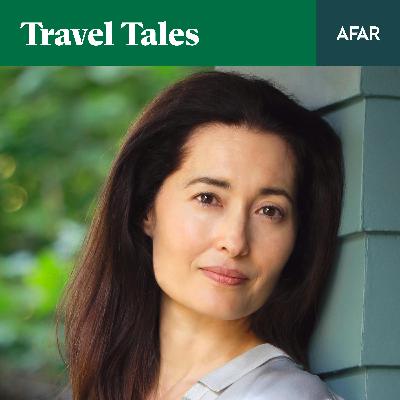
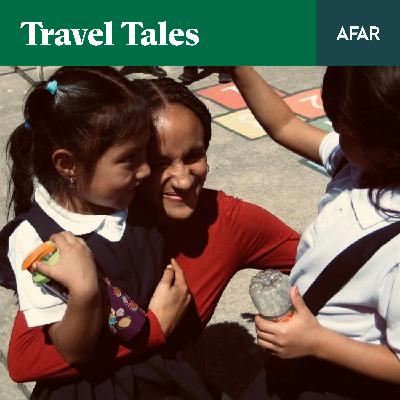
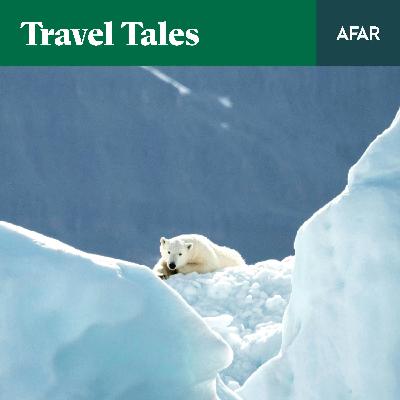
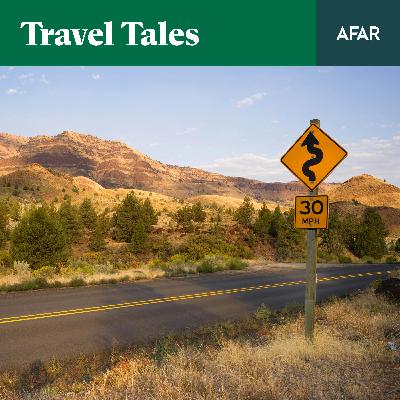
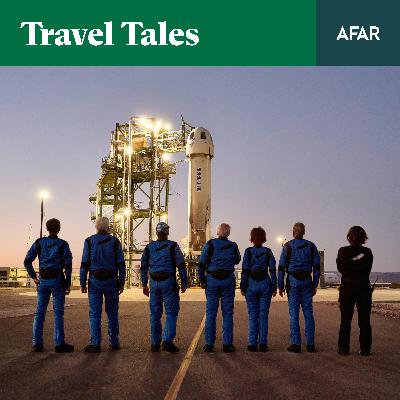
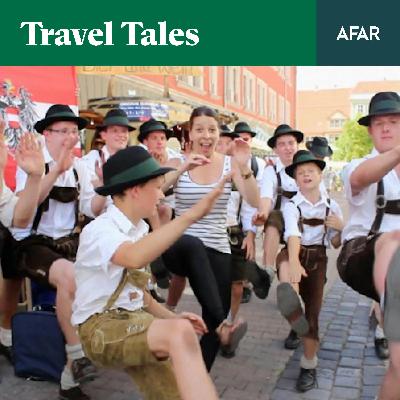
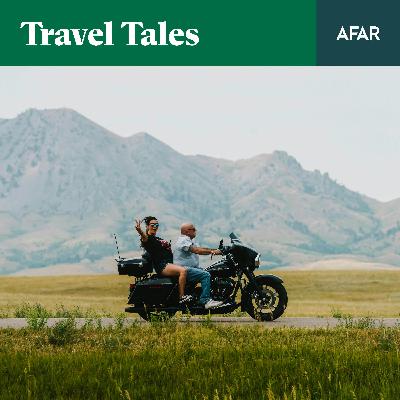
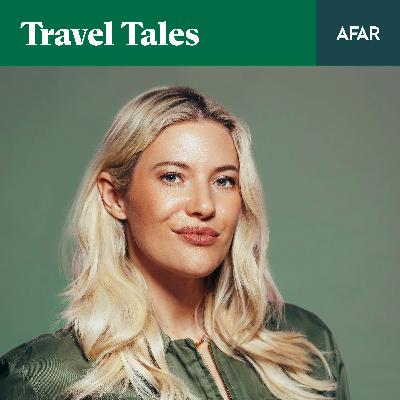
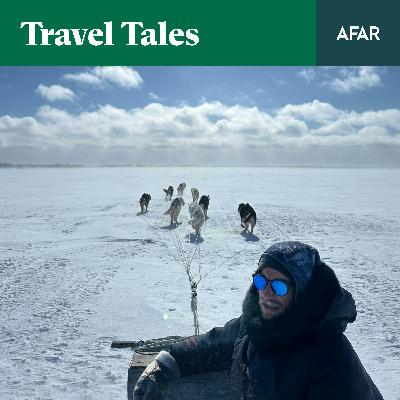
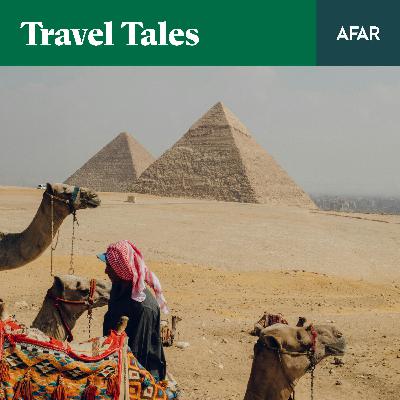











@13:15 … being from New York City you would think that there was plenty of opportunity for her to go to Latin restaurant or Guatemala food restaurant locally, to see what the food was going to be like when she went to the actual country.